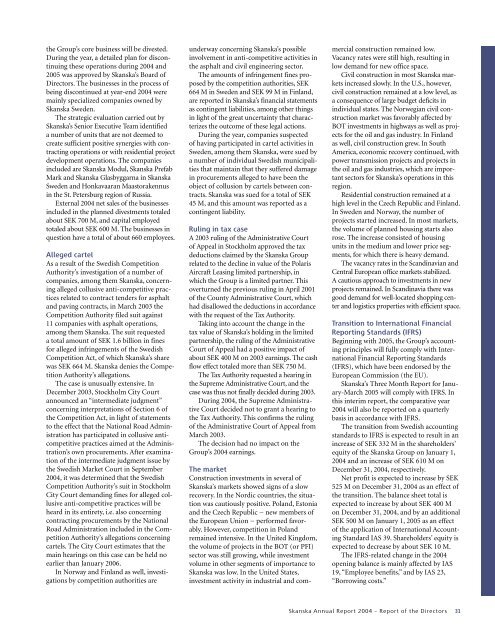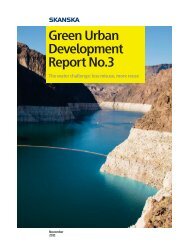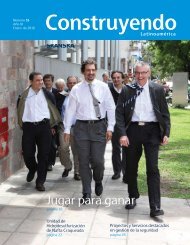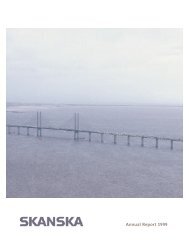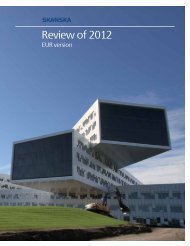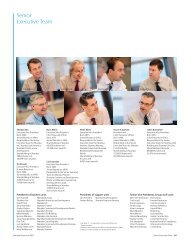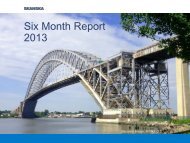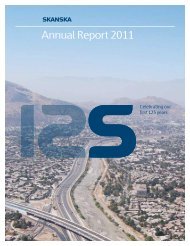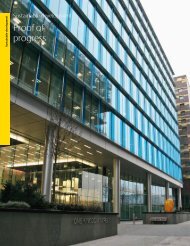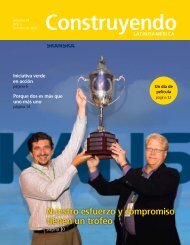ANNUAL REPORT 2004 - Skanska
ANNUAL REPORT 2004 - Skanska
ANNUAL REPORT 2004 - Skanska
You also want an ePaper? Increase the reach of your titles
YUMPU automatically turns print PDFs into web optimized ePapers that Google loves.
the Group’s core business will be divested.<br />
During the year, a detailed plan for discontinuing<br />
these operations during <strong>2004</strong> and<br />
2005 was approved by <strong>Skanska</strong>’s Board of<br />
Directors. The businesses in the process of<br />
being discontinued at year-end <strong>2004</strong> were<br />
mainly specialized companies owned by<br />
<strong>Skanska</strong> Sweden.<br />
The strategic evaluation carried out by<br />
<strong>Skanska</strong>’s Senior Executive Team identified<br />
a number of units that are not deemed to<br />
create sufficient positive synergies with contracting<br />
operations or with residential project<br />
development operations. The companies<br />
included are <strong>Skanska</strong> Modul, <strong>Skanska</strong> Prefab<br />
Mark and <strong>Skanska</strong> Glasbyggarna in <strong>Skanska</strong><br />
Sweden and Honkavaaran Maastorakennus<br />
in the St. Petersburg region of Russia.<br />
External <strong>2004</strong> net sales of the businesses<br />
included in the planned divestments totaled<br />
about SEK 700 M, and capital employed<br />
totaled about SEK 600 M. The businesses in<br />
question have a total of about 660 employees.<br />
Alleged cartel<br />
As a result of the Swedish Competition<br />
Authority’s investigation of a number of<br />
companies, among them <strong>Skanska</strong>, concerning<br />
alleged collusive anti-competitive practices<br />
related to contract tenders for asphalt<br />
and paving contracts, in March 2003 the<br />
Competition Authority filed suit against<br />
11 companies with asphalt operations,<br />
among them <strong>Skanska</strong>. The suit requested<br />
a total amount of SEK 1.6 billion in fines<br />
for alleged infringements of the Swedish<br />
Competition Act, of which <strong>Skanska</strong>’s share<br />
was SEK 664 M. <strong>Skanska</strong> denies the Competition<br />
Authority’s allegations.<br />
The case is unusually extensive. In<br />
December 2003, Stockholm City Court<br />
announced an “intermediate judgment”<br />
concerning interpretations of Section 6 of<br />
the Competition Act, in light of statements<br />
to the effect that the National Road Administration<br />
has participated in collusive anticompetitive<br />
practices aimed at the Administration’s<br />
own procurements. After examination<br />
of the intermediate judgment issue by<br />
the Swedish Market Court in September<br />
<strong>2004</strong>, it was determined that the Swedish<br />
Competition Authority’s suit in Stockholm<br />
City Court demanding fines for alleged collusive<br />
anti-competitive practices will be<br />
heard in its entirety, i.e. also concerning<br />
contracting procurements by the National<br />
Road Administration included in the Competition<br />
Authority’s allegations concerning<br />
cartels. The City Court estimates that the<br />
main hearings on this case can be held no<br />
earlier than January 2006.<br />
In Norway and Finland as well, investigations<br />
by competition authorities are<br />
underway concerning <strong>Skanska</strong>’s possible<br />
involvement in anti-competitive activities in<br />
the asphalt and civil engineering sector.<br />
The amounts of infringement fines proposed<br />
by the competition authorities, SEK<br />
664 M in Sweden and SEK 99 M in Finland,<br />
are reported in <strong>Skanska</strong>’s financial statements<br />
as contingent liabilities, among other things<br />
in light of the great uncertainty that characterizes<br />
the outcome of these legal actions.<br />
During the year, companies suspected<br />
of having participated in cartel activities in<br />
Sweden, among them <strong>Skanska</strong>, were sued by<br />
a number of individual Swedish municipalities<br />
that maintain that they suffered damage<br />
in procurements alleged to have been the<br />
object of collusion by cartels between contracts.<br />
<strong>Skanska</strong> was sued for a total of SEK<br />
45 M, and this amount was reported as a<br />
contingent liability.<br />
Ruling in tax case<br />
A 2003 ruling of the Administrative Court<br />
of Appeal in Stockholm approved the tax<br />
deductions claimed by the <strong>Skanska</strong> Group<br />
related to the decline in value of the Polaris<br />
Aircraft Leasing limited partnership, in<br />
which the Group is a limited partner. This<br />
overturned the previous ruling in April 2001<br />
of the County Administrative Court, which<br />
had disallowed the deductions in accordance<br />
with the request of the Tax Authority.<br />
Taking into account the change in the<br />
tax value of <strong>Skanska</strong>’s holding in the limited<br />
partnership, the ruling of the Administrative<br />
Court of Appeal had a positive impact of<br />
about SEK 400 M on 2003 earnings. The cash<br />
flow effect totaled more than SEK 750 M.<br />
The Tax Authority requested a hearing in<br />
the Supreme Administrative Court, and the<br />
case was thus not finally decided during 2003.<br />
During <strong>2004</strong>, the Supreme Administrative<br />
Court decided not to grant a hearing to<br />
the Tax Authority. This confirms the ruling<br />
of the Administrative Court of Appeal from<br />
March 2003.<br />
The decision had no impact on the<br />
Group’s <strong>2004</strong> earnings.<br />
The market<br />
Construction investments in several of<br />
<strong>Skanska</strong>’s markets showed signs of a slow<br />
recovery. In the Nordic countries, the situation<br />
was cautiously positive. Poland, Estonia<br />
and the Czech Republic − new members of<br />
the European Union − performed favorably.<br />
However, competition in Poland<br />
remained intensive. In the United Kingdom,<br />
the volume of projects in the BOT (or PFI)<br />
sector was still growing, while investment<br />
volume in other segments of importance to<br />
<strong>Skanska</strong> was low. In the United States,<br />
investment activity in industrial and commercial<br />
construction remained low.<br />
Vacancy rates were still high, resulting in<br />
low demand for new office space.<br />
Civil construction in most <strong>Skanska</strong> markets<br />
increased slowly. In the U.S., however,<br />
civil construction remained at a low level, as<br />
a consequence of large budget deficits in<br />
individual states. The Norwegian civil construction<br />
market was favorably affected by<br />
BOT investments in highways as well as projects<br />
for the oil and gas industry. In Finland<br />
as well, civil construction grew. In South<br />
America, economic recovery continued, with<br />
power transmission projects and projects in<br />
the oil and gas industries, which are important<br />
sectors for <strong>Skanska</strong>’s operations in this<br />
region.<br />
Residential construction remained at a<br />
high level in the Czech Republic and Finland.<br />
In Sweden and Norway, the number of<br />
projects started increased. In most markets,<br />
the volume of planned housing starts also<br />
rose. The increase consisted of housing<br />
units in the medium and lower price segments,<br />
for which there is heavy demand.<br />
The vacancy rates in the Scandinavian and<br />
Central European office markets stabilized.<br />
A cautious approach to investments in new<br />
projects remained. In Scandinavia there was<br />
good demand for well-located shopping center<br />
and logistics properties with efficient space.<br />
Transition to International Financial<br />
Reporting Standards (IFRS)<br />
Beginning with 2005, the Group’s accounting<br />
principles will fully comply with International<br />
Financial Reporting Standards<br />
(IFRS), which have been endorsed by the<br />
European Commission (the EU).<br />
<strong>Skanska</strong>’s Three Month Report for January-March<br />
2005 will comply with IFRS. In<br />
this interim report, the comparative year<br />
<strong>2004</strong> will also be reported on a quarterly<br />
basis in accordance with IFRS.<br />
The transition from Swedish accounting<br />
standards to IFRS is expected to result in an<br />
increase of SEK 332 M in the shareholders’<br />
equity of the <strong>Skanska</strong> Group on January 1,<br />
<strong>2004</strong> and an increase of SEK 610 M on<br />
December 31, <strong>2004</strong>, respectively.<br />
Net profit is expected to increase by SEK<br />
525 M on December 31, <strong>2004</strong> as an effect of<br />
the transition. The balance sheet total is<br />
expected to increase by about SEK 400 M<br />
on December 31, <strong>2004</strong>, and by an additional<br />
SEK 500 M on January 1, 2005 as an effect<br />
of the application of International Accounting<br />
Standard IAS 39. Shareholders’ equity is<br />
expected to decrease by about SEK 10 M.<br />
The IFRS-related change in the <strong>2004</strong><br />
opening balance is mainly affected by IAS<br />
19, “Employee benefits,” and by IAS 23,<br />
“Borrowing costs.”<br />
<strong>Skanska</strong> Annual Report <strong>2004</strong> – Report of the Directors<br />
31


